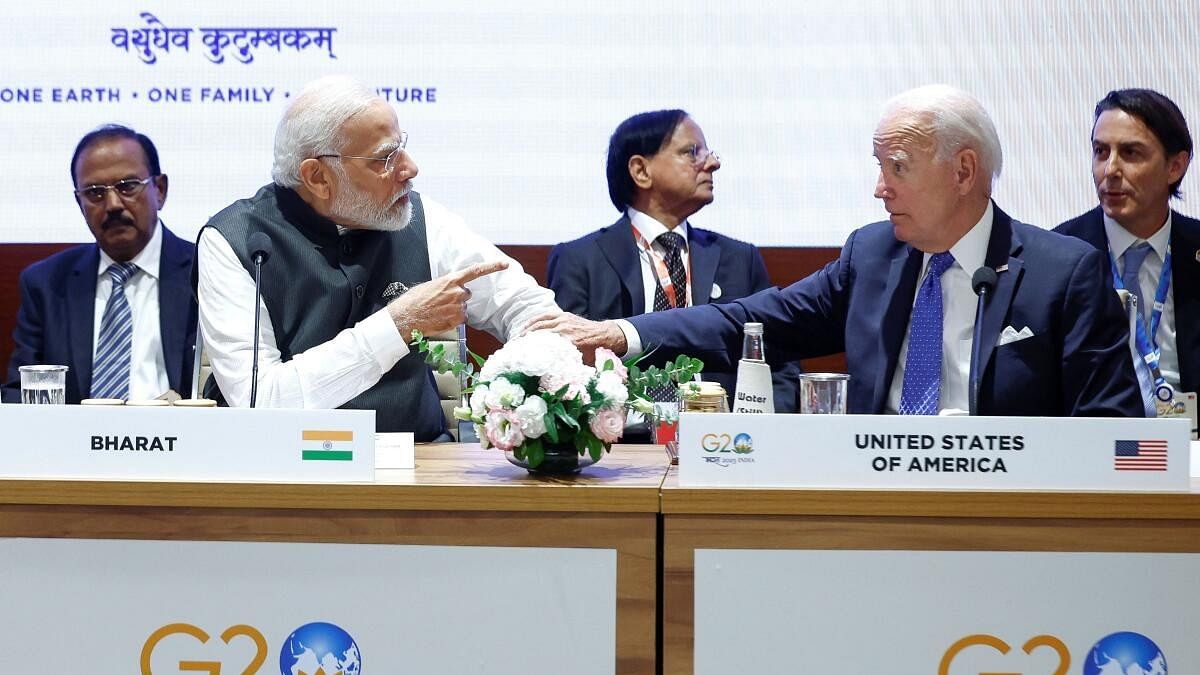
Indian PM Narendra Modi with US President Joe Biden at the G20 Summit in Delhi.
Credit: Reuters Photo
A series of hardball negotiations by India with China, Russia and other key Western players and a strong backing by Brazil, South Africa and Indonesia to the efforts helped New Delhi achieve consensus on the G20 declaration, defying fears about whether the document could be issued at all in view of sharp divisions in the bloc on the Ukraine war, diplomatic sources said on Saturday.
India managed well in convincing China to agree to the text relating to the Ukraine conflict after the European Union concurred with the text, they said.
On the first day of the summit on Saturday, Prime Minister Narendra Modi announced that the G20 leaders' declaration was adopted with consensus, throwing a major surprise as both the Russia-China combine and the West had indicated that they would not budge from their respective position on the Ukraine conflict.
French diplomatic sources said India has displayed a 'kind of power and an ability to bring countries together', adding not many countries are in a position to negotiate as New Delhi has done to take on board comments from everyone, and work out a compromise proposal on the Ukraine conflict.
It was a tough negotiation and the consensus on the declaration was a great achievement by India, European sources said on the condition of anonymity.
Asked about the absence of the term 'Russian aggression' on Ukraine in the declaration which figured in the Bali G20 declaration, the sources said the Western countries were satisfied with the overall outcomes.
Another source said India circulated the final draft to the G20 members on Friday night saying if they do not agree to it, then there will be no declaration.
India's G20 Sherpa Amitabh Kant said the negotiations with Russia and China took place last night.
The French diplomatic sources described the declaration as 'very satisfactory' from Paris's point of view.
The joint statement also found mention of Modi's famous remark that 'Today's era must not be of war.' His vision of Lifestyles for Sustainable Development (LiFE) also figured in the declaration.
The French diplomatic sources also said that the Indian presidency wanted to see a language of 'consensus emerge'.
To achieve a language of consensus on a subject as divisive as Ukraine, 'we had to be able to reaffirm what we said in Bali, which we have done by recalling the Bali conversation', a source said.
'We had to refer to the United Nations texts, which are indeed mentioned,' the source said.
'Then we had to affirm a few obvious points for us, but which are not necessarily obvious for everyone, that is that a war of territorial conquest is unacceptable, that the sovereignty and territorial integrity of States must be respected, and that a just and lasting peace must respect these principles,' the source said.
'All this is well incorporated in the text and, as was our main objective at this summit. It enables us to look ahead to what should be the solution for a just and lasting peace at the end of the war in Ukraine,' the source added.
The declaration said that all States must refrain from conquering territories by force.
'Russia is the only country to have done so. All this helps to build consensus for the future,' the source said.
In the declaration, the G20 leaders said they looked forward to meeting again in Brazil in 2024 and in South Africa in 2025, as well as in the United States in 2026 at the beginning of the next cycle.
'We welcome Saudi Arabia's ambition to advance its turn for hosting the G20 Presidency in the next cycle. We also look forward to the Paris Olympic and Paralympic Games in 2024 as a symbol of peace, dialogue amongst nations and inclusivity, with participation of all,' it said.